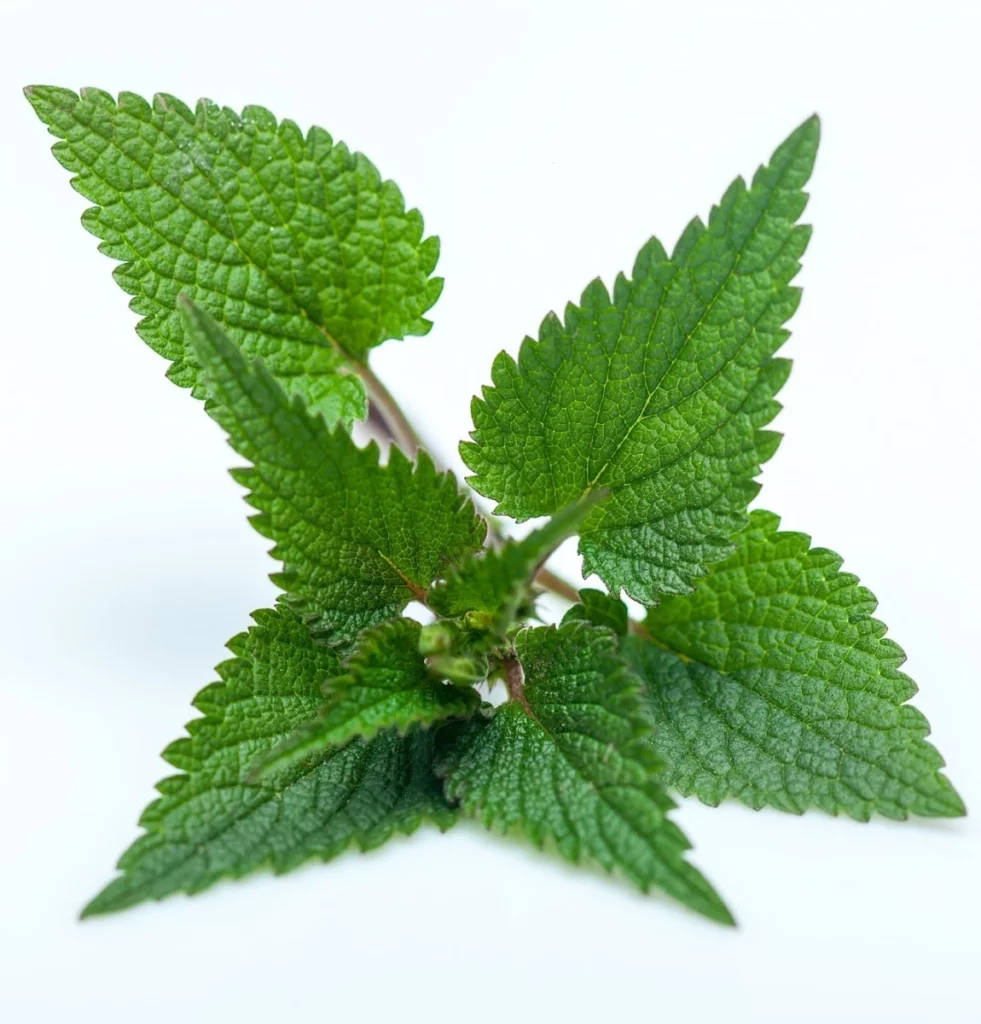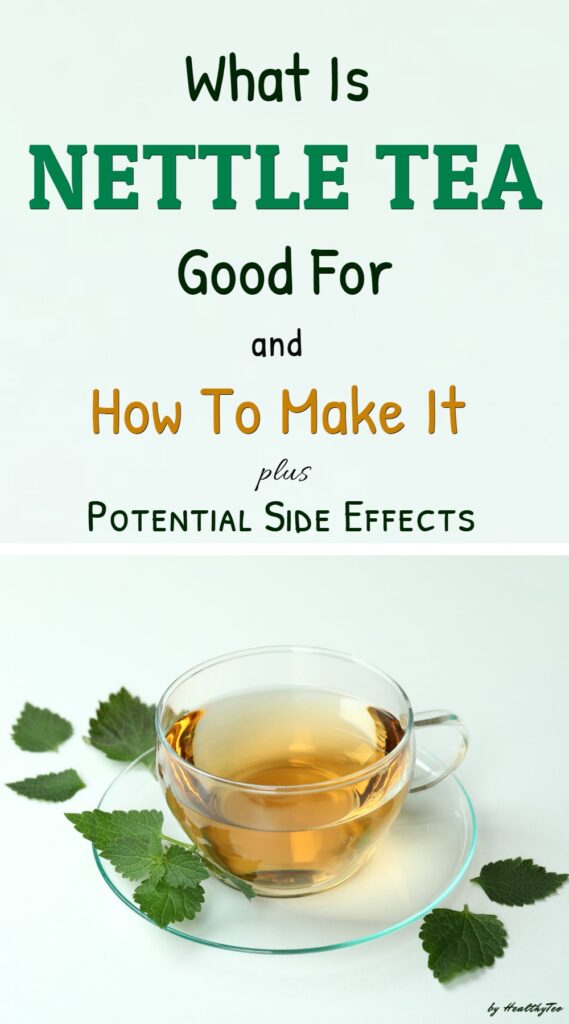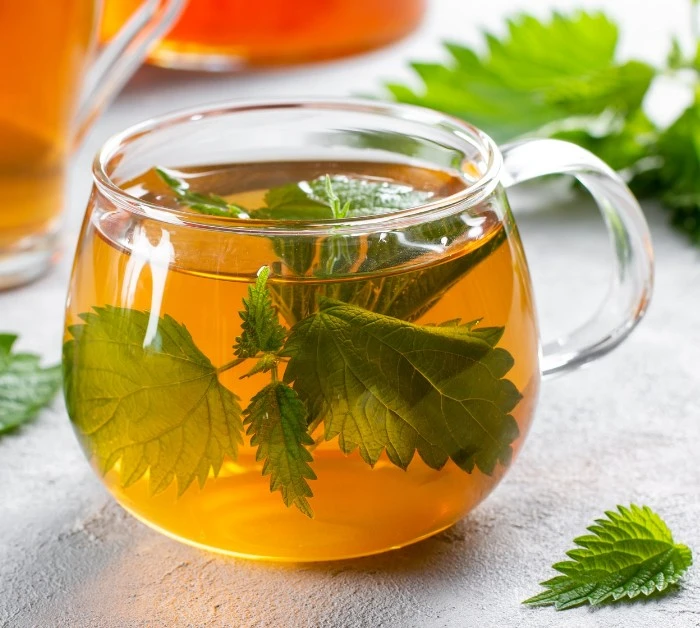Nettle tea is a delicious and beneficial herbal beverage. Learn how to make it using fresh or dried nettle leaves and discover the benefits of this tea!
Before we get into the benefits of nettle tea and the potential side effects of drinking this herbal tea, let’s start with the basics and explore what nettle tea is and what you should know about the stinging nettle!
This post may contain affiliate links, which means we may receive a small commission, at no cost to you, if you make a purchase through a link. For more information, please see our disclosure.
What is Nettle Tea?
Nettle tea is a herbal tea prepared from the leaves of the nettle plant. The plant is also known as stinging nettle (Urtica dioica) or nettle leaf.
What makes this beverage unique is that five of the six primary types of this plant are coated with tiny spines and trichomes, which effectively transfer histamines and other irritants into the skin when they come into touch with people. This protective system prevents humans from eating or picking this plant. However, despite these reactions, nettles are safe to eat when soaked in water.
You may brew your own nettle tea by growing and picking your own leaves and mixing them with hot water. Alternatively, you can buy loose nettle tea or in teabags.
Also, stinging nettles are an excellent culinary herb that may be used in a variety of meals, from pasta to soups and stews to herbal drinks and tonics.
If you’ve never cooked with nettle before, here’s a fantastic nettle soup recipe by Feasting from Home that you should try.

What is Nettle Tea good for?
There hasn’t been a lot of scientific research done on nettle tea. The majority of research has concentrated on dried nettle leaves or tinctures.
The sections that follow will look at the evidence for nettle’s potential health benefits more generally.
Contains many nutrients
According to one 2018 study, nettle plant leaves are high in a variety of nutrients, including:
- Vitamins: A, C, and K, as well as several B vitamins
- Minerals: iron, calcium, magnesium, phosporus, potassium and sodium
- Fatty acids
- Amino acids
- Polyphenols: kaempherol, quercetin, caffeic acid, and other flavonoids
- Pigments: beta-carotene, lutein, and other carotenoids
Because nettles contain various key vitamins and minerals, drinking nettle tea may help individuals receive more of them.
However, the nutritional composition of nettle tea varies depending on where the leaves are grown, how strong the tea is, and other factors.
May reduce hay fever symptoms
Hay fever is caused by an allergic reaction to allergens that can be found both outside and inside, such as pollen, dust mites, or tiny particles of skin and saliva shed by animals. Its symptoms include sneezing, itching, and a blocked or runny nose.
The 2018 review found evidence that nettle can influence the receptors and enzymes involved in allergic responses. As a result, nettle has the potential to be a viable natural remedy for hay fever.
Human studies, however, show that stinging nettle is as effective as, if not slightly more effective than, a placebo in treating hay fever.
More research is needed to determine the impact of stinging nettle on hay fever symptoms.
Urinary tract health
Another way that nettle tea benefits you is by reducing the symptoms of a urinary tract infection. Nettle may help in the removal of potentially dangerous bacteria from the urinary tract.
People suffering from urinary conditions such as benign prostatic hyperplasia (BPH) may benefit from this. This is a condition in which a man’s prostate gland enlarges, producing discomfort and urination difficulties.
According to a 2013 study, people with BPH who drank nettle tea had fewer symptoms than those who don’t. However, it is uncertain how efficient stinging nettle is in comparison to conventional treatments.
If you are experiencing signs of a urinary infection, you should visit your doctor.
Arthritis and pain
Nettle tea has phytotherapeutic ingredients that can help with arthritis, osteoarthritis, and gout.
According to the Arthritis Foundation, nettle tea may also help to reduce inflammation and pain associated with osteoarthritis. People who want to try tea should drink one cup three times a day, according to the Arthritis Foundation.
It is, nevertheless, important to consult with a doctor first.
May lower blood pressure
Stinging nettle has traditionally been used to treat high blood pressure (source).
According to animal and test-tube research, stinging nettle may help reduce blood pressure by relaxing the blood vessels and reducing the force of the heart’s contractions. According to a study published in The Scientific World Journal, drinking fresh nettle tea on a regular basis can assist to treat hypertension.
However, the effects of stinging nettle on blood pressure in people remain unknown. Additional human research is required before suggestions may be made.
Potential side effects of Nettle Tea
While herbal teas are generally safe to consume, there are some potential nettle tea side effects to consider before adding the drink into your daily routine.
Some people have reported having an allergic reaction to nettle infusions, including hives. Also, be cautious when handling fresh stinging nettle leaves since their hair-like barbs can irritate your skin. These barbs can inject a variety of chemicals that can cause rashes, bumps, hives, and itching. However, these chemicals diminish as the leaves are processed.
If you’re handling the nettle leaves yourself, make sure to cover any exposed skin before harvesting the leaves to avoid allergic reactions and rashes.
In rare cases, nettle tea can cause stomach discomfort and diarrhea. If this happens, stop using it or minimize your use of it.
Pregnant women
Nettle tea and nettle leaves should NOT be consumed by pregnant or nursing women. When pregnant or breastfeeding, always seek the advice of a healthcare professional before using herbal teas.
Children under the age of 12 should avoid nettle as well due to a lack of research.
Interactions
Nettle tea should be avoided by people who have blood sugar problems since it may drop blood sugar levels. Drinking this tea while taking blood sugar medication may cause levels to drop too low, resulting in dizziness or fainting.
Nettle can potentially influence the effects of blood pressure medications. These include diuretics and antihypertensive medications.
If you have issues with water retention due to a condition such as an edema, you should avoid drinking nettle tea.
Nettle tea has high levels of vitamin K and can interfere with anticoagulant medications (blood thinners).
If you are using NSAIDs for a medical issue, consult your doctor before drinking nettle tea. The natural chemicals in tea may interact with drugs and cause serious negative effects.
It is recommended to speak with a doctor before consuming nettle tea to see whether the body can accept its product or whether it will cause allergies and symptoms in the body.
How to make nettle tea
You can buy nettle tea loose-leaf or in teabags, but you can also grow or pick the leaves yourself.
If you prefer to collect nettle leaves to make tea at home, wear gloves to avoid the painful sting of the hair growth on the leaves. It’s also a good idea to wear a long-sleeved shirt and long pants to avoid brushing against the plants and getting irritated. Avoid handling the leaves too much. If feasible, cut the leaves immediately into a bag or container for simple storage and transportation.
Ingredients:
- 1 cup fresh nettle leaves or 1 tsp if using dried leaves
- 2 cups water (for fresh leaves) or 8 ounces water (for dried leaves)
- 1 tsp honey or brown sugar – optional
Instructions:
- 1. On a stove, bring water to a rapid boil.
- 2. To the boiling water, add the fresh nettle leaves and reduce the heat down to medium. Aim for one cup of nettle leaves for every two cups of water when using fresh leaves. For dried leaves, use one teaspoon for every eight ounces of water.
- 3. Allow the leaves to steep in the water for 5 to 7 minutes. If you want the flavor to be stronger, allow the leaves to steep in the water for a longer duration.
- 4. If the flavor is too strong for you, add a spoonful of honey or brown sugar to sweeten it up. When finished, serve the tea hot and enjoy the hot, nutritious beverage.
To begin, limit yourself to one cup of nettle tea to ensure that you don’t have any reactions to it.
The takeaway
Nettle tea is a refreshing drink that can be beneficial in a variety of ways when consumed in moderation, no more than 1-3 cups per day.
The evidence supporting the benefits of nettle tea for specific health issues is minimal. However, studies on nettle leaves suggest that they may aid people with urinary tract problems, lessen hay fever symptoms, and help with arthritis and pain.
Overall, more research is needed to better understand the benefits of nettle tea and how it works in the body.
Also, be mindful of the potential side effects of nettle tea consumption. Nettle tea should be avoided by persons who have blood sugar or blood pressure problems, and pregnant women should avoid it as well. If you are using NSAIDs for a medical condition, talk to your doctor before drinking nettle tea.
Finally, as with any herbal tea, consult your doctor before trying any new herb. Even all-natural foods and beverages, such as tea, can induce allergic responses or interact with certain medications. Some herbs can be dangerous to those who have specific medical issues.

Disclaimer: While we have looked into the research on the health benefits of this tea, this is only for informational purposes and should not be construed as medical advice. Those with health-related questions should seek the advice of a medical professional.




